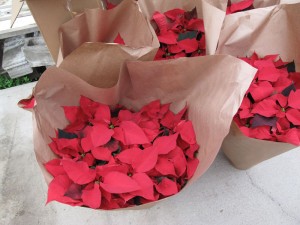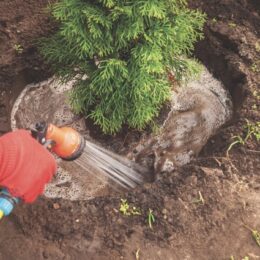Horrors unfold before me about this time each year. But they are not on a big screen from some Hollywood holiday blockbuster; they are watching well-meaning shoppers steer their carts full of holiday gift plants through gusty winds and miserably cold temperatures and place these frigid plant victims into icy automobiles.
I wondered how many of these plants would even make it to their intended recipients? And how long would they last if they did?
Plants make great gifts, but only if the plant has a chance to be enjoyed by the recipient! During cold weather, even the healthiest plant can be damaged during delivery. Cold and wind exposure for as short a time as it takes to walk to your car can damage some plants.
If you make your purchase from a florist or other supplier, be sure the salesperson wraps your purchase in floral wrapping paper to protect it from cold temperatures and the wind. Get the plant from the store to your car as quickly as possible. Preheat the car beforehand to prevent further chilling injury.
Plants left in an unheated car can be injured or killed quickly, so drop the plants off at home before running other errands. If the plant must be in cold air for any length of time, insulate it by placing it in a box with several layers of newspaper bundled around the tops as well as around the plant’s container.
Packing plants in boxes with newspaper also will help protect them from tipping over. Besides breaking stems and leaves, tipping often causes soil to spill from the pot, breaking roots along the way.
At home, get the plants back to room temperature as soon as possible, and remove the wrap for good air circulation. Keep plants protected from both warm and cold drafts. Place the plants away from exterior doorways and heating vents. Most plants, particularly those in flower, prefer a moderately cool location, such as 60-70 degrees F during the day and a little cooler at night.
Bright light also is important for most plants. Light will be brightest near a window, but keep leaves from direct contact with cold window glass. Leaves in direct contact with cold panes can be injured, and the water vapor they transpire may condense on the glass to form ice. The plant’s leaves then may freeze to the glass.
Check the soil for dryness, as plants that have been on display for a bit may be in need of watering immediately. Water thoroughly enough to allow some excess water to come through the drainage holes at the bottom.
Giving your gift plants a bit of tender care is a small investment in many years of enjoyment.
Rosie Lerner is the Purdue Extension consumer horticulturist and a consumer of Tipmont REMC. Questions about gardening issues may be sent to: “Ask Rosie,” Electric Consumer, P.O. Box 24517, Indianapolis, IN 46224, orec@ElectricConsumer.org




